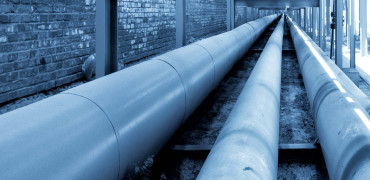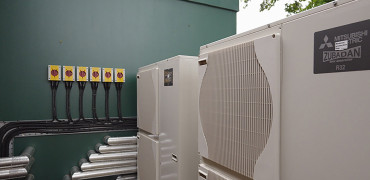The country has hit something of a milestone recently in its journey towards clean energy, with the 250,000th installation of a domestic heat pump in the UK.
Coincidentally this happened not long before we entered Heat Pump Week.
The notable milestone was important because the heating of our homes accounts for roughly 20% of the country’s greenhouse gas emissions. But if we want to get to net zero carbon emissions before it’s too late, then we really need to find a way of breaking our reliance on gas and oil for fueling our boilers and heating our homes.
No one should think this is going to be easy or straightforward - we have an awfully long way to go before we can rival Norway where heat pumps are installed in two-thirds of homes,
A little while ago I wrote about a huge housing development being built near to where I live in the Southwest of England. The first phase of this scheme involves the construction of 740 homes of all different shapes, sizes and tenures.
But the one thing they all have in common is that they are being fitted with individual gas boilers to heat the homes and to provide hot water for future residents.
Given what we know about the damage being wreaked to our climate system by carbon dioxide, methane and natural gas - this feels like some form of madness, particularly as the work done to date has not gotten beyond building the scheme’s access roads and putting in the various pipes for the utility companies’ use.
The developers market their new homes as “sustainable” which is a bit of a stretch
No interest in switching
But planning permission was granted for this scheme a few years ago and the developers have shown no interest in switching from gas boilers to some other form of heating.
For most homes in the UK, the logical alternative to traditional gas fired heating systems is likely to be an electric air source heat pump and / or solar panels. Or in the case of large developments like the one near to me, it could be several ground source heat pumps linked together in a network.
When representatives of the developers attended various public events locally over the Summer and early Autumn, (the usual mix of fetes, fairs and festivals), they were adamant that they are not changing from installing gas boilers UNLESS there was emergency legislation passed requiring such a change.
I think that is extremely unlikely, but in the meantime the developers continue to market their new homes as “sustainable” which I honestly think is a bit of a stretch.
So, what does this mean for the main domestic heating alternative, air source heat pumps?
Currently they look like a large air conditioning unit placed on the outside wall of a house and they work like a fridge in reverse. They capture heat from the air, and they use refrigerant gas and a compressor to raise the temperature enough to heat the water flowing through a home’s radiators. Back in Norway they comfortably deal with their average winter temperature of -7 degrees C.
Facts, not fiction or hearsay
There are claims that heat pumps are expensive to purchase and expensive to run, while never achieving the sort of internal temperatures achieved by gas, or oil. It is also claimed by some that they are noisy. Let’s look at the reality.
Heat pumps are more expensive to buy than a typical gas boiler. In the UK, an air-source heat pump costs on average just over £12,500 to buy and install – four to five times the cost of a gas boiler. However, the Government offers grants of £7,500 to households through its boiler upgrade scheme, which brings their cost down to roughly double that of a gas boiler.
But critics of heat pumps have said that householders who switch face higher energy bills because the electricity used to power them costs roughly four times the price of gas.
Independent experts have debunked this, saying that on average heat pumps are far more efficient than gas boilers, turning one unit of electricity into 2.5 to five units of heat whereas a gas boiler often produces only 0.9 to 0.95 units of heat for each gas unit because they lose heat through the pipes and flue.
At the recent Labour party conference, the energy secretary Ed Miliband, announced a “home upgrade revolution” aimed at making the country’s housing stock cleaner and cheaper to run. This included new heating systems and better insulation.
Research has also shown that a new breed of energy tariff designed specifically for heat pump users could tip the balance in their favour. Octopus Energy and Ovo Energy have both released cheaper-than-average tariffs tailored for heat pumps, which would make one cheaper to run than a gas boiler.
Andrew Sissons, a deputy director at Nesta, a charity which undertakes research into home heating innovation, says: “Insulation is a good thing to do in its own right – but your home doesn’t need to be insulated to get a heat pump.” A well-insulated home can make heat pumps run more efficiently, but it is more important to make sure that the correct size heat pump and radiators are installed, he added.
It turned out its noise level was equivalent to an electric toothbrush being used
Benefits of insulation
In short: if you live in a home where the heating keeps your rooms comfortably warm, it is very likely that you won’t need to undertake any extra insulation before installing a heat pump. But if you can afford to invest in low-cost measures such as draught exclusion, double glazing and loft insulation, you will get this money back in lower bills over the long term.
What about claims that heat pumps are noisy? Well, it turns out that a heat pump will actually make little more noise than your average fridge or dishwasher, as each device typically emits a constant hum of between 40 and 60 decibels.
The main source of heat pump noise is the fan, which draws in air, and the compressor, which raises the temperature of the refrigerant by increasing pressure on its gases.
They are designed to be installed outside the home to extract warmth from the air, ground or water. But could this be an issue in urban areas, with lots of heat pump fans humming within a relatively small location?
A friend of mine who is a councillor recently told me an anecdote about a constituent who had bought a heat pump but was required to apply for planning permission prior to having it fitted because it was marginally noisier than average. It turned out its noise level was equivalent to an electric toothbrush being used.
Noise comparisons
But the madness of the requirement to obtain planning permission is that the property in question is located near to a busy A road, which has heavy traffic running on it almost continuously from 5am to well beyond midnight each day.
The chances of any neighbour being able to hear the heat pump in use, let alone being disturbed by it were extraordinarily remote.
The reality is that there will be some homes which won’t be suitable for an external heat pump – such as high-rise blocks without any outdoor space – but the majority of households are expected to be able to use one, according to experts.
For all housing types, there will need to be space inside for a hot water tank, often where the old boiler used to be. And for older buildings, other upgrades – such as loft and wall insulation, or the replacement of old radiators with larger models and underfloor heating – may be needed.
I think what this all means is that as more people install heat pumps and more word gets around, the population will become more familiar with their look, their hum and how they work. But the real difference will probably happen when their costs of purchase and operation get better known.
Of course, the Government has a huge part to play in this and so far, all the signs are that Ed Miliband has a high awareness of these issues and he has a mandate within the cabinet as well as support from the Treasury to deliver the changes necessary.
Patrick Mooney is News editor, Housing Management & Maintenance




